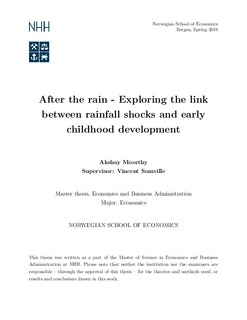After the rain : exploring the link between rainfall shocks and early childhood development
Master thesis
Permanent lenke
http://hdl.handle.net/11250/2612176Utgivelsesdato
2019Metadata
Vis full innførselSamlinger
- Master Thesis [4372]
Sammendrag
This thesis studies the link between exogenous and unforeseen variations in household income
and the development level of very young children in Uganda using rainfall shocks as an
instrument for income variation. The analysis links household data and child development
measures from 2336 households from 9 Ugandan districts with 28 years of rainfall data to
look at the effects of rainfall shocks in-utero and in early childhood upon measures of the
motor, early literacy, early numeracy and social-emotional development of children between
the ages of 3 and 5. A simple model of childhood development is developed to illustrate
possible causal channels and challenges associated with studying this relationship. Reduced
form OLS estimates indicate the existence of links between early life rainfall shocks and a
child’s non-cognitive development level. There is no evidence of a significant link between
rainfall shocks in-utero and our measures of child development. Heterogeneity analysis reveals
differential links along gender, education and asset ownership dimensions. Decomposition of
yearly rainfall deviation into binary and seasonal shocks indicates different effects of shocks
in the context of agriculture in Uganda. Rainfall shocks in the Ugandan harvest season may
have the opposite effect of rainfall shocks in the planting season. The results are highly
sensitive to the choice of inference calculation. Beyond education and health programs,
insuring households against income risks from climate events as well as mitigating the source
of these risks could play an important role in meeting early child development goals.
